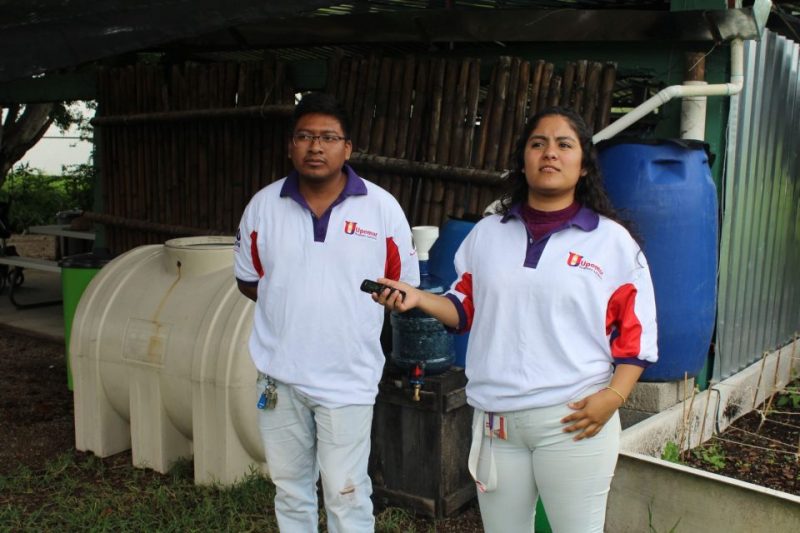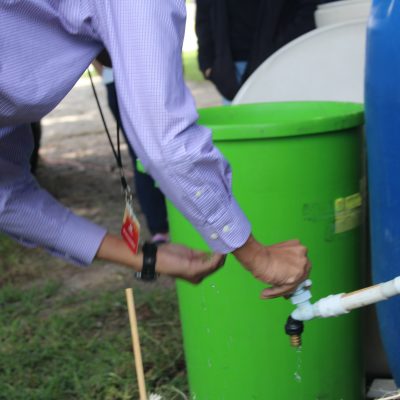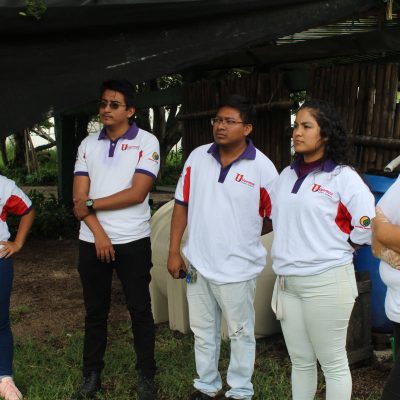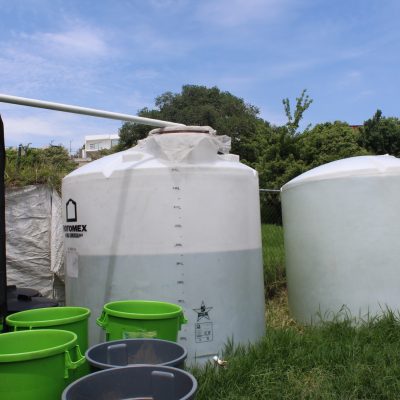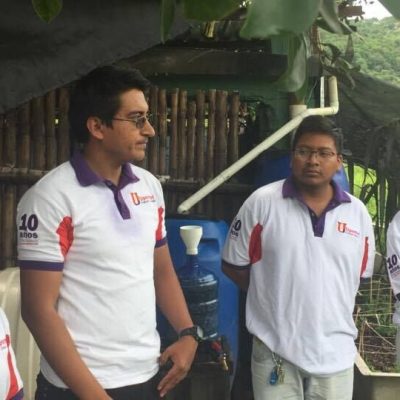Por: Luisa Montes (Ciudades Verdes)
English follows
Una modesta construcción al fondo de la Universidad Politécnica del Estado de Morelos, fue recuperada y convertida en el Centro de Capacitación Ambiental, mejor conocido como CECAM. Este espacio rehabilitado alberga las oficinas del programa ambiental que es el que rige los lineamientos de sustentabilidad en la universidad. El CECAM se distingue del resto de las edificaciones del campus de muchas maneras; la principal se debe a que es un prototipo de vivienda/oficina sustentable donde se emplean energías alternas, tiene un huerto de plantas medicinales, composta, manejo de residuos y en el tema del agua, contempla acciones que comprenden todo el ciclo; desde la captación pluvial, pasando por los diferentes usos como el riego, el uso sanitario y finalmente el tratamiento a través del humedal.
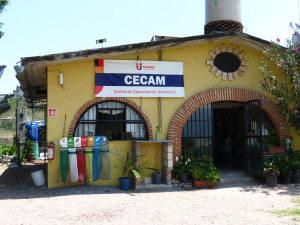
El CECAM, pretende ser el prototipo de vivienda/oficina sustentable porque es allí donde se reciben visitantes,desde alumnos de primaria, secundaria, preparatoria, universidad, personas mayores y todo aquel que se acerque interesado en capacitarse, allí se imparten todo tipo de talleres ambientales, con temáticas diversas como creación y operación de composta, huertos orgánicos, energías alternas, manejo de residuos, de suelos, cuidado del agua y muchos más.
Para ello cuentan con una construcción aledaña, diseñada para apoyar el proceso enseñanza/aprendizaje denominada aula abierta, donde se apoyan idealmente la licenciatura en ingeniería ambiental, así como la asignatura de auditoria ambiental ofreciendo cursos regulares y capacitaciones especiales a los estudiantes de la UPEMOR y a sus visitantes. Es en esta coyuntura que el proyecto Planteles Educativos Sustentables se suma a esta iniciativa a través de la figura del Reto Sustentable; estrategia que obedece al interés de apuntalar y sostener proyectos de sustentabilidad en los planteles educativos.
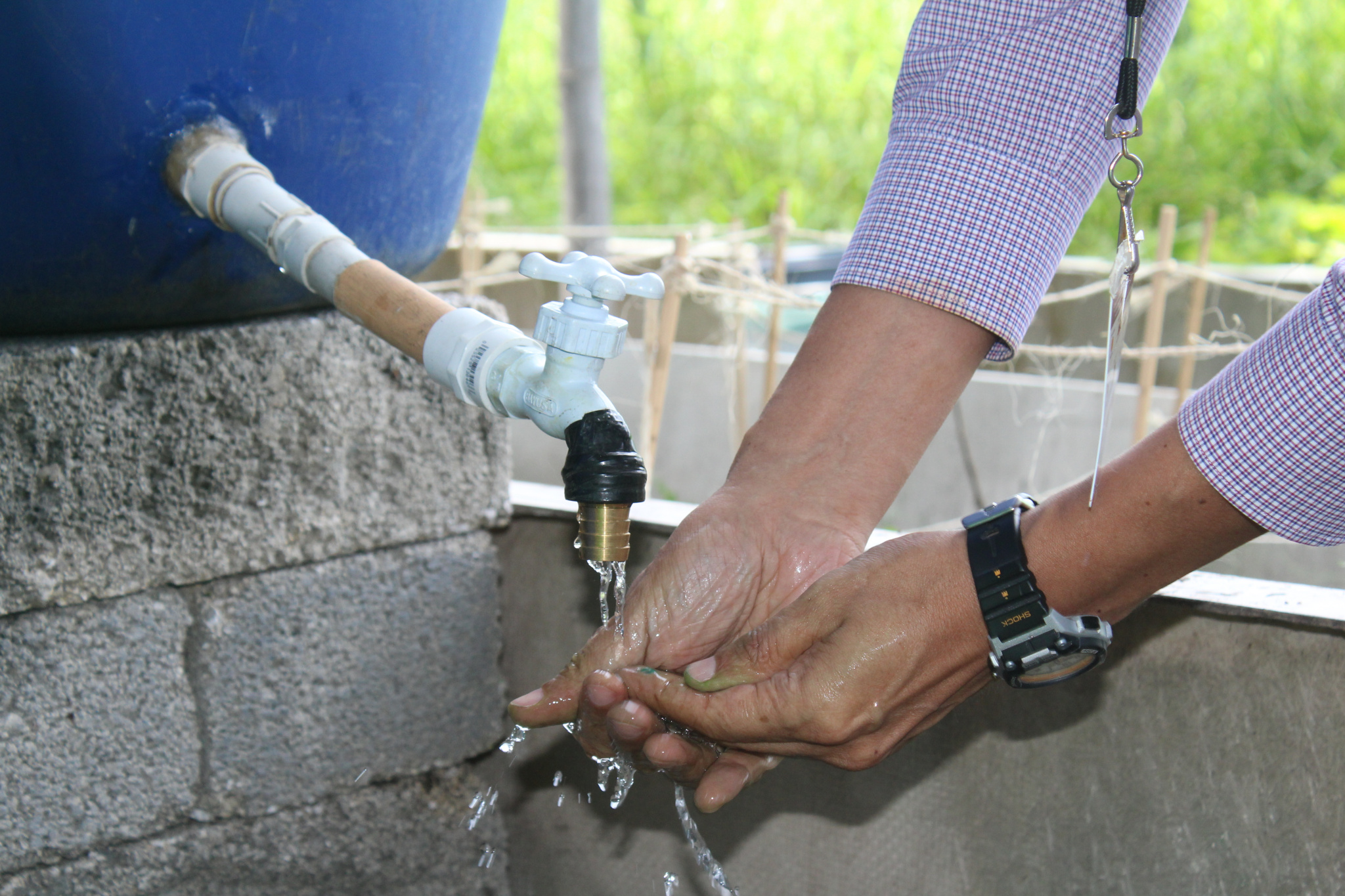
Uno de los Retos sustentables del CECAM es la captación de agua en el techo del aula abierta, éste integra todo un sistema diseñado, instalado y operado por los propios estudiantes de la Licenciatura en ingeniería ambiental, busca que el aula abierta cumpla además de su función informativa y formativa, una más sustentable mediante un sistema de captación y filtración de agua.
La idea general es captar la mayor cantidad de agua pluvial y filtrarla preparándola para diversos usos, así mismo, se imparten clases respecto a temáticas ambientales, se trata de una propuesta que pretende integrar la captación y la capacitación ambiental integrando estos dos elementos no sólo para la universidad sino para compartirlo con la comunidad y otras instancias educativas y empresariales haciéndoles notar a partir de la propia experiencia todos los beneficios que otorga el uso de ecotecnias, particularmente las relacionadas con la captación, uso y tratamiento del agua.
Actualmente tanto el CECAM como su aula abierta se han convertido en uno de los espacios preferidos por la comunidad universitaria, sus áreas verdes y el uso de ecotecnias ofrecen un clima fresco y de mucho aprendizaje por lo que los visitantes al tiempo que se refrescan y aprenden, se contagian de energía y buenas ideas para aplicar algunas de estas estrategias en sus entornosfamiliares.Blog basado en entrevista con Valeria Dávila y Sergio García (responsables del proyecto),miembros del CECAM y estudiantes que participaron en diferentes actividades vinculadas con este proyecto el 10 de julio de 2017 en UPEMOR.
UPEMOR: Rainwater collection and environmental classroom
By: Luisa Montes (Ciudades Verdes)
Translation by April Obregon
A modest construction at the back of the Universidad Politécnica del Estado de Morelos (UPEMOR) was recovered and converted into the Environmental Training Center, better known as CECAM. This rehabilitated space houses the offices of the environmental program that establish the guidelines for sustainability at the university. The CECAM distinguishes itself from the rest of campus buildings in many ways. It is a prototype of a sustainable house/office where alternative energies are used. It also has a medicinal plant garden, composts as well as waste and water management. It contemplates actions that comprise the whole water cycle; from rainwater collection, for different uses such as irrigation, sanitary use and finally waste water treatment through a wetland.

The CECAM aims to be a prototype of a sustainable house / office because it receives many visits from primary, middle, high school and university students, as well as seniors citizens and anyone who is interested in training. There are all kinds of environmental workshops, with diverse themes such as the creation and operation of compost, organic orchards, alternative energies, waste management, soil care, water care and many more.
For this, they count with an adjacent construction, designed to support the teaching / learning process. It is an outdoor classroom to support the environmental engineering program, as well as the environmental auditing programs that offer regular courses and special trainings to UPEMOR students and their visitors.

It is at this juncture that the Sustainable Campuses project joins this initiative through the figure of the Sustainable Challenge; a strategy that aims to encourage and support sustainability projects in educational institutions. One of the Sustainable Challenges at the CECAM is the rain water collection project, a special roof in the outdoor classroom. It integrates a system designed, installed and operated by the students of the Environmental Engineering program. It seeks to open the classroom to fulfill its informative and formative function, a more sustainable one through a rainwater collection and filtration system. The general idea is to capture the greatest amount of rainwater and to filter it , preparing it for diverse uses, and in that way, teach classes about environmental subjects.
This is a proposal that seeks to integrate a project for rainwater collection and environmental education not only accessible to the university but to share it with the community and other educational and entrepreneurial institutions. It will highlight the experience and all the benefits provided by the use of eco technologies, particularly those related to the collection, use and treatment of water. Nowadays both the CECAM and its outdoor classroom have become one of the favourite spaces by the university community. Its green areas and the use of eco technologies offer a fresh climate and one where much learning takes place so that while the visitors refresh and learn, they get energy and good ideas to apply some of these strategies in their familiar surroundings.
Blog based on an interview with Valeria Dávila and Sergio García (responsible for the project), members of CECAM and students who participated in different activities linked to this project on July 10, 2017 in UPEMOR

